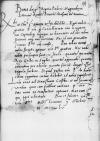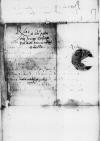List #2872
Bona Sforza do Ioannes DANTISCUSCracow (Kraków), 1545-10-02
| odebrano Schmolainen (Smolajny), 1545-10-13 Rękopiśmienne podstawy źródłowe:
| ||||
Tekst + aparat krytyczny + komentarz Zwykły tekst Tekst + komentarz Tekst + aparat krytyczny
Reverendo in Christo Patri, domino
Reverende in Christo Pater, sincere no paper damaged⌈[o]o paper damaged⌉bis dilecte.
Egit nobis gratias Paternitas Vestra, quod cancellarium eius in negotio suo capitulique benigne ac humaniter ad nos admiserimus atque aud paper damaged⌈[d]d paper damaged⌉iverimus. Nos id non gravatim fecimus Paternitatis Vestrae causa.
Pro rebus novis nobis scriptis agimus Vestrae Paternitati gratias. Haec eadem nobis perscripta sunt ex
Litteras nostras ad
Bene et feliciter valeat paper damaged⌈[leat]leat paper damaged⌉ Vestra Paternitas.
Dat(ae) or Dat(um)⌈Dat(ae)Dat(ae) or Dat(um)⌉


 BCz, 3465, p. 316
BCz, 3465, p. 316